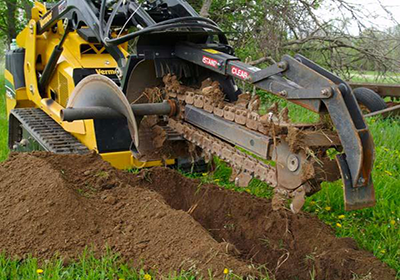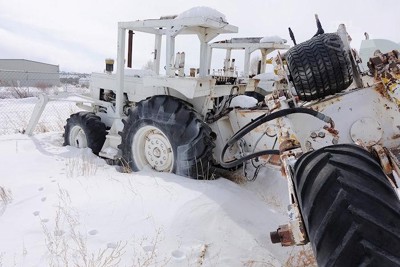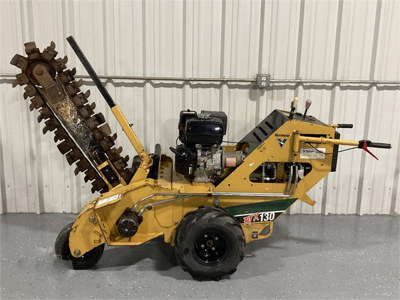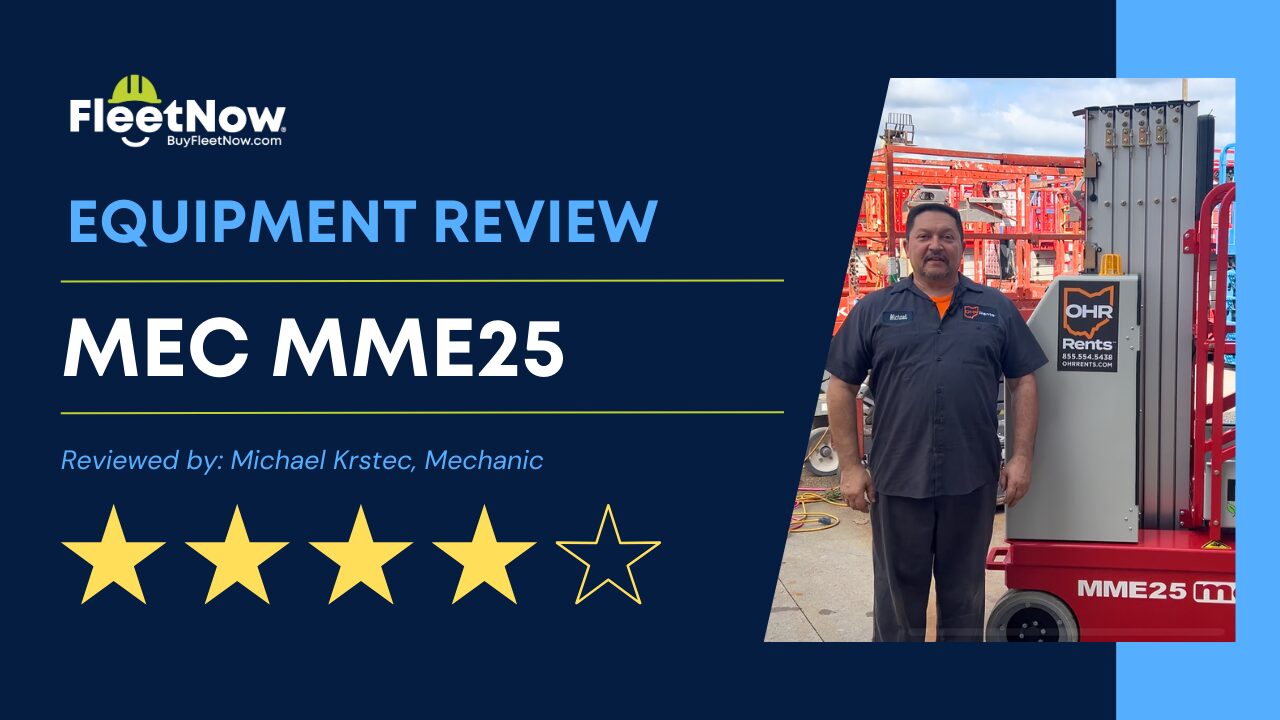Is a Trencher Faster than a Mini Excavator?
The speed of a trencher compared to a mini excavator depends on several factors, including the size and type of trencher or excavator, the depth and length of the trench, and the soil conditions. In general, for dedicated trenching tasks where the primary goal is to excavate a trench of a specific width and depth, a trencher can often be faster than a mini excavator. Trenchers are specifically designed for efficient trenching and can quickly cut through soil to create trenches of consistent dimensions.
On the other hand, mini excavators are versatile machines capable of performing various tasks beyond trenching, such as digging, lifting, and material handling. While mini excavators can also be used for trenching by using a bucket attachment, their versatility and slower trenching speed compared to dedicated trenchers may affect overall efficiency for trenching tasks.
Ultimately, the choice between a trencher and a mini excavator depends on the specific requirements of the job. For rapid and efficient trenching in relatively straightforward conditions, a trencher may be the faster option. However, if the project involves a variety of tasks beyond trenching or requires flexibility in maneuvering and operating in tight spaces, a mini excavator could be a more suitable and versatile choice despite potentially slower trenching speeds.
How Much Does a Trencher for Sale Cost?
The cost of a trencher for sale can vary widely depending on several factors, including the type of trencher (e.g., walk-behind, ride-on, tractor-mounted), size, brand, condition (new or used), and additional features. Here’s a general price range based on common types of trenchers.
Walk-Behind Trenchers: New walk-behind trenchers suitable for smaller projects can range from $1,000 to $5,000. Used walk-behind trenchers in good condition may be available for less, typically ranging from $500 to $3,000.
Ride-On Trenchers: New ride-on trenchers designed for larger projects can range from $10,000 to $50,000 or more, depending on size and features. Used ride-on trenchers can range from $5,000 to $30,000, depending on age, hours of use, and condition.
Tractor-Mounted Trenchers: Trenchers designed to be mounted on tractors or skid steers can range from $5,000 to $30,000 or more, depending on specifications and compatibility with the base machine.
Specialized Trenchers (e.g., micro trenchers, rockwheel trenchers): Prices for specialized trenchers can vary significantly based on size, features, and intended application. New specialized trenchers can range from $5,000 to $100,000 or more. Used specialized trenchers may be available starting from $2,000 to $50,000, depending on condition and specifications.
When purchasing a trencher, consider not only the upfront cost but also factors such as maintenance requirements, availability of parts, and after-sales support. Consulting with equipment dealers or specialists can help you assess your needs and budget to make an informed decision when selecting a trencher for your excavation projects.
Can a Trencher Cut Through Roots?
Yes, a trencher is capable of cutting through roots to a certain extent, depending on the size, type, and hardness of the roots encountered. Trenchers are specifically designed to excavate narrow trenches for laying utilities, irrigation lines, or drainage systems, and they typically have sharp, durable cutting teeth or chains that can penetrate through soil and smaller roots.
However, when encountering larger or tougher roots, especially from mature trees or shrubs, a trencher may struggle or become less effective. Thick roots can dull the cutting teeth or chains and may require additional effort or specialized equipment to remove. In such cases, it’s important to assess the depth and location of the roots before trenching and consider using alternative methods such as root cutting tools or excavators to clear the area before trenching.
For trenching projects where roots are a concern, it’s advisable to inspect the site beforehand and take necessary precautions to ensure smooth and efficient trenching operations. Additionally, using the appropriate size and type of trencher based on the expected soil conditions and root presence can help minimize challenges and ensure successful trenching outcomes. Consulting with experienced operators or equipment specialists can provide valuable insights and recommendations for tackling trenching projects in areas with roots.
How Long Does a Trencher Last?
Trenchers can last for well over 1,000 hours when properly taken care of. In fact, it’s not unheard of for trenching machines to last over 3,000 hours. The newer models are built even tougher, so they can last even longer.

What Are Popular Brands of Trenchers for Sale?
Several popular brands of trenchers are widely recognized for their quality and performance in the market:
Ditch Witch: Ditch Witch is a well-known brand that offers a wide range of trenchers suitable for various applications. Their trenchers are highly regarded for their durability, productivity, and innovative features, making them a top choice for contractors and rental fleets.
Toro: Toro manufactures reliable and efficient trenchers designed for both residential and commercial use. Toro trenchers are known for their user-friendly operation, versatility, and compact design, making them ideal for landscaping and utility installation projects.
Vermeer: Vermeer is a leading manufacturer of heavy equipment, including high-quality trenchers. Vermeer trenchers are known for their robust construction, cutting precision, and superior performance in challenging soil conditions, making them popular among professionals in the construction and landscaping industries.
Shop for Trenchers for Sale on BuyFleetNow.com
What Should I Look for When Shopping for a Trencher for Sale?
When shopping for a trencher for sale, consider the trencher’s digging depth and width capacity, the type of terrain it can handle, the power source (gasoline or diesel), and the overall condition (new or used) to ensure it meets your specific excavation needs.
What Jobs Can I Use a Trencher For?
A trencher is commonly used for various excavation and trenching jobs, including:
Installing underground utilities such as water pipes, electrical conduits, and irrigation lines.
Creating trenches for drainage systems, including French drains and surface water management.
Digging trenches for landscaping projects, such as installing edging or burying cables and wires.
Excavating trenches for foundation footings or underground structures during construction.
Cutting trenches for installing fencing posts or barriers in agricultural or residential settings.
How Deep and Wide Does a Trencher Dig?
The depth and width that a trencher can dig depends on the specific model and type of trencher. Generally, walk-behind trenchers can dig trenches up to 36 inches deep and 4 to 6 inches wide, while ride-on trenchers are capable of digging deeper trenches ranging from 4 to 10 feet deep and 6 to 12 inches wide, or even wider for specialized models.
How Much Does It Cost to Ship a Trencher?
Light but long, it will cost you at least $1.75 per mile to ship a Trencher in 2023.
Video: How to Operate a Ditch Witch Trencher
Recent Equipment News
MEC MME25 Review: Specs, Features & Industry Perspective
MEC MME25 Review: Specs, Features & Industry [...]
Construction Equipment Trends 2025: Inside Q1–Q2 Demand & What It Means for You
Table of Contents Top 10 Categories Q1 vs [...]
FleetNow Announces Elijah Dollarhide as 2025 Construct Your Future Scholarship Winner
FleetNow Announces Elijah Dollarhide as Construct Your Future Scholarship [...]












































